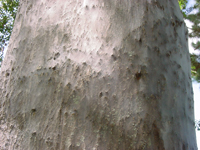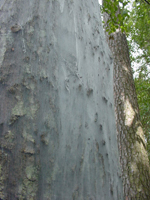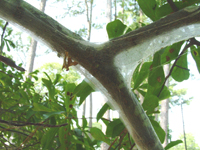In May, June, and July, hardwood trees along the Texas coast from Houston to Beaumont and about 125 miles inland may occasionally be covered with a mat of cobweb-like material. Homeowners often express concern when they see the trunk and major limbs of their trees encased in a giant silken web (see photos below). This webbing is produced by small insects called barklice or psocids (pronounced sokids or sosids) and is completely harmless to the tree. The insects are probably common during most years but are only noticed when population levels are high and the amount of webbing becomes more apparent. Because barklice cause no damage to the trees, no control is recommended. The webbing, which never extends into the foliage, is quite thin and fragile and will usually disappear in a few weeks. Heavy infestations of barklice seem to be associated with relatively long periods of high humidity, which may account for the fact that most reports in Texas are from the upper coastal area.
Barklice are small, soft-bodied insects with long antennae; they resemble aphids. Even though these insects are called barklice, they are not lice. They are not parasitic on anything, they are not pests of humans or animals, and they do not harm the trees they infest. The barklice that produce the webbing on trees in Texas belong to the insect order Psocoptera and have the scientific name Archipsocus nomas. They can be found in all the southern states from Florida to Texas. They are not known to produce webbing on pine trees. Water oak (or pin oak) seems to be the most common tree on which the webbing is found.
The adults are about 1/8th-inch long and possess two pairs of membranous wings that are held roof-like over the body when at rest. Barklice have simple metamorphosis and go through three stages -- egg, nymph, and adult. The nymphs resemble adults except they are smaller and lack wings. Barklice have chewing mouthparts and are considered a beneficial insect since they feed on fungi, spores, pollen, lichens, and other debris on the surface of a tree's bark. In effect, they clean the bark of a tree for free!



Typical webbing made by barklice on the trunk and branches of trees